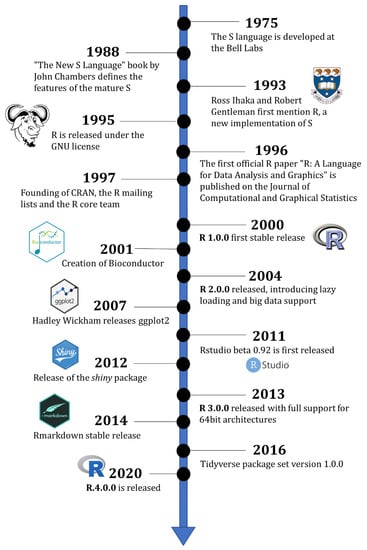The Greatest Guide To Bioinformatics Tutor
The Greatest Guide To Bioinformatics Tutor
Blog Article
Getting The Bioinformatics Tutor To Work
Table of ContentsBioinformatics Tutor Can Be Fun For Anyone3 Simple Techniques For Bioinformatics TutorBioinformatics Tutor for DummiesHow Bioinformatics Tutor can Save You Time, Stress, and Money.What Does Bioinformatics Tutor Do?
Of the total amount participants included in the training, 80% were pupils from public college organizations, while the continuing to be 20% came from private organizations. To certify for a certificate of engagement, trainees were called for to participate in a minimum of 90% of the total training hours. As a result of this demand, an outstanding 95% of the individuals successfully obtained their certificates, having not just met the minimum participation standards yet also completed all appointed tasks throughout the training.
During the elevation of the COVID-19 pandemic, especially in between June and August 2020, the task group was charged with organizing specialized training in bioinformatics. This training was particularly focused on students from the study group Center for Research study in Applied Computer at the Federal University of Pará (UFRA) The adjustment to remote knowing systems because of the pandemic developed a chance to explore brand-new teaching methodologies and digital devices that boosted both reach and performance.
This training course was made to give an available yet extensive overview of Artificial Intelligence techniques, particularly as applied in bioinformatics (Bioinformatics Tutor). This online format allowed involvement from pupils throughout Brazil, numerous of whom could not have had the opportunity to participate in in-person sessions.
A Biased View of Bioinformatics Tutor
A notable feature of this program was its focus on hands-on understanding. About 50% of the complete training hours were dedicated to functional tasks where students built intelligent versions and applications in a variety of clinical domains, consisting of genes, molecular biology, and environmental information evaluation. Extensively utilized tools and structures such as Spyder, Google Colab, Jupyter Notebooks, and Orange were incorporated into the coursework. These platforms enabled students to participate in real-time information control, model training, and formula testing.
Sixty of them were associated with various greater education and learning institutions in the state of Pará, while the remaining twenty came from organizations located in five other Brazilian states. By presenting Artificial Intelligence in a practical and appropriate context, the effort served to connect the void between concept and real-world application, supplying students with a solid foundation for future research or work in the area.
The training effort created part of a broader scholastic outreach effort called the Bioinformatics when driving task. This task has, throughout the years, introduced loads of pupils to the globe of bioinformatics and computational biology. The occasions held under this umbrella campaign have happened across numerous regions and years, as summed up in Table 1 (Listing of occasions, areas, years, and complete varieties of pupils and teachers)
Numerous of these teams, originally brought with each other by their participation in training events, have actually given that gone on to produce independent scientific study in cooperation with regional scholastic establishments. The training not only promoted scientific thinking within the context of bioinformatics however additionally sparked collaborative connections that expanded beyond the training setting.
Bioinformatics Tutor Can Be Fun For Everyone
The very same group, excluding IH and RR, additionally acted as tutors for the practical training components. Financing for the job was offered through the grant 88887.200562/ 2018-00 from CAPES.
The Federal College of Pará's Office of Research (PROPESP/UFPA) likewise supplied financial backing, especially for the manufacturing of the final manuscript. The authors check over here state no financial or industrial conflicts of interest that might have affected the research study. All analyses and viewpoints shared in this article are solely those of the authors and do not always show those of their particular organizations, the publisher, editors, or reviewers included in the magazine process.

Facts About Bioinformatics Tutor Uncovered
From an instructional perspective, the teaching technique used in the training was purposefully interactive. Courses were performed in a way that encouraged student involvement and discussion, going past rote memorization to check out how ideas are created, applied in daily life, and evaluated in academic settings. The educational philosophy focused on nurturing both solid and battling students, providing personalized support, and structure self-confidence through continual mentorship and persistence.

Each group, containing about 36 participants, was supported by 3 advisors-- many of whom were postdoctoral researchers with specific proficiency. These mentors not just assisted make the group jobs however also facilitated their implementation, making sure that each research study question was both appropriately challenging and relevant. The goal was to supply a biologically practical context that individuals can explore via open-ended objectives and accessibility to curated datasets.
For extra insights into the method and learn the facts here now results of this project-based discovering method, viewers are routed to S1 Text, that includes comprehensive summaries of the instructional structure, analysis techniques, and job styles used in the training sessions.
Bioinformatics Tutor Can Be Fun For Everyone
Of the total participants entailed in the training, 80% were pupils from public higher education and learning establishments, while the staying 20% came from exclusive organizations. To qualify for a certification of involvement, trainees were required to navigate here go to at the very least 90% of the overall training hours. Notably, beyond the pupils who enlisted in the training sessions, seven skilled teachers got involved in supplying the training courses, while 3 devoted research teachers worked with the overall training process. Roughly 50% of the complete training hours were committed to functional activities where trainees built smart versions and applications in a range of scientific domain names, consisting of genetics, molecular biology, and environmental data analysis. The training not just fostered scientific thinking within the context of bioinformatics yet likewise sparked collaborative relationships that expanded past the training atmosphere.
Report this page